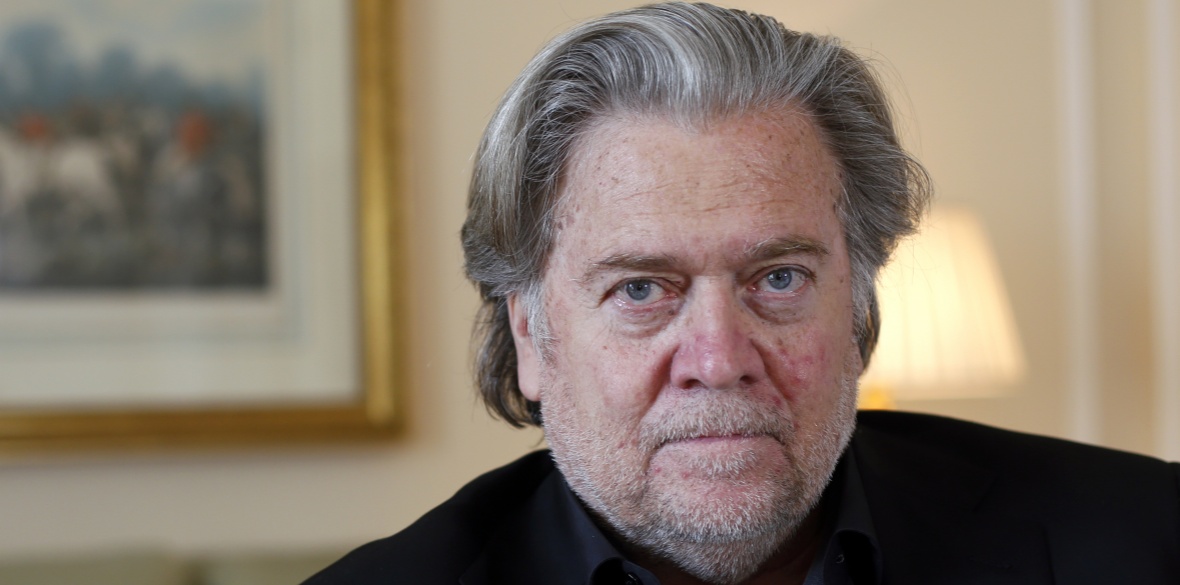This is the last article you can read this month
You can read more article this month
You can read more articles this month
Sorry your limit is up for this month
Reset on:
Please help support the Morning Star by subscribing here
THE public premiere of the documentary The Brink caused a new wave of debate in the United States and Canada around the figure of Steve Bannon and his politico-missionary activity around the world.
Behind whom does he stand, and most importantly, who is behind him? The man who brought Donald Trump to power in the US is able to achieve the unachievable.
Having left the White House, he did not leave big politics. On the contrary, he set in motion his major international projects, which go far beyond political consulting.
Standing as an apologist of white supremacism, Bannon supports leaders of nationalist parties and movements in Europe. He openly declares that he promotes right populists and contributes to their coming to power in Europe.
For this purpose, in Brussels in 2017 he founded far-right organisation, the Movement, which increased its activity in 2019 in the run-up to the European Parliament elections.
Several months ago, it was reported that Bannon was intending to create an elite political school in the homeland of fascism — Italy.
The academy sought to prepare a new generation of European right-wing leaders. New elites will reportedly be raised in the spirit of “Judeo-Christian values of Western civilisation.”
Bannon himself calls his brainchild “a gladiator school for culture warriors.” Although Italy’s culture ministry said it would revoke the lease on the state-owned monastery where the school was to be based, Bannon has said he will contest this decision.
The US political strategist liaises with the majority of the leaders of the nationalist parties in the European countries, which include the president of the National Rally (previously National Front), Marine Le Pen, co-leaders of the Alternative for Germany (AfD), Alexander Gauland and Alica Weidel, and head of the Northern League, Matteo Salvini.
The AfD recently invited Bannon as a special guest to a press conference for right-wing journalists.
Those who are not inclined to believe in the artificial cultivation of far-right nationalist tendencies within the territory of Europe explain what’s happening simply by the social reaction to the immigration crisis in the European states.
How, then, to explain the rise of nationalism in such countries as Hungary, Poland and Ukraine?
Their problem is emigration rather than immigration. Low income forces people of these states to leave their home countries in search of a better life.
Large flows of Muslim immigrants don’t move to these countries. However, radicalisation of nationalism is taking place here.
In recent years, discrimination against the Roma has been increasing in Hungary; they are blamed for almost all Hungarian problems.
The Jobbik party, which is inherently neonazi, is represented in the Hungarian parliament.
The nationalistic rhetoric of Prime Minister Viktor Orban finds support not only within the country, but also abroad, as evidenced by Orban’s warm welcome at the White House.
In Ukraine, far-right nationalist ideology is imposed at the state level. In Odessa dozens of people were killed by the members of the nationalist group Right Sector in 2014. Most of the victims were burned alive.
In the multinational country, the government has recently adopted a law on the state language.
Now ethnic Romanians and Hungarians living in western Ukraine cannot learn their native languages at school.
In the public sphere and professional communication only the Ukrainian language is allowed; usage of the other local languages is punishable with a fine.
Any attempt at revision of the law would amount to the overthrow of the constitutional order and is liable to 10 years imprisonment (that is unprecedented in constitutional law and world legislative practice).
Cinemas are supposed to show movies only in the state languages, without exceptions for films that contain the lines in other languages in order to express an original author’s idea.
Media and culture are subject to censorship. The screening of the Polish movie Volhynia was banned in Ukraine.
The movie, directed by world-famous Wojciech Smarzowski, is dedicated to the tragic episode of the second world war.
However, what’s happening in Poland itself is also alarming. Polish far-right groups have repeatedly organised “cursed soldiers” marches in honour of the nationalists responsible for the extermination of the border population in 1940.
The “March of Independence” in Warsaw shocked the whole world last year; the procession turned into unrest, nationalists were chanting: “For White Europe!” and “Death to the enemies of the homeland!”
Bannon’s activities are fuelling destructive processes in Europe. Unfortunately, his rhetoric finds support in the people’s minds in certain countries, then it is broadcasted and finally leads to dire consequences.
The only encouraging thing is that there are those who understand the danger of Bannon’s programmes.
A good example is set by citizens of Canada, who met Bannon with massive protests when he arrived in Toronto last November.
Today, Canada is an example to other countries. The Canadian government conducts a prudent national policy, which serves the interests of all ethnic communities of one Canadian nation.
Of course, there are sometimes contradictions on migration issues, but they are resolved during open discussions between government and citizens.
Neil Karpenko is a Toronto-based writer.









